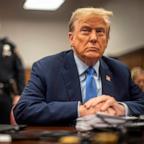CIA Confident It Would Catch Iran Cheating on Nuclear Deal
Official has "reasonably high degree of confidence" CIA would see "deviations."
ASPEN, Colorado — -- The number two man at the CIA said today he has a "high degree of confidence" that if Iran cheats on the newly-signed, controversial nuclear deal, the U.S. intelligence community would catch them in the act.
"Our assessment of the provisions that are in the JCPOA (Joint Comprehensive Plan of Action) that provide the real-time, persistent access to the cleared sites, as well as a mechanism for getting scheduled access to suspicious sites, combined with other capabilities and information that we have available to us, gives us a reasonably high degree of confidence that we would be able to detect Iran if it were trying to deviate from the requirements that they've signed up to in the JCPOA," David Cohen, Deputy Director of the Central Intelligence Agency said at the Aspen Security Forum today. "So I think our assessment is that the JCPOA gives us a good ability to detect Iranian deviation from the limitations on enrichment and the other specific elements in the JCPOA."
When referring to access to Iranian sites, Cohen was presumably referring to the access provided to International Atomic Energy Agency inspectors, as stipulated in the agreement, not access by the CIA.
Robert Cardillo, head of the National Geospatial-Intelligence Agency, said that from the perspective of his agency, he agreed with Cohen.
"From the physical nature of that which they need to adhere to to remain complaint, I think we've got a very good capability to do that, of course with the IAEA's [International Atomic Energy Agency's] assistance," he said at the panel, which was moderated by ABC News Chief Investigative Correspondent Brian Ross.
A couple hours after Cohen and Cardillo's comments, the Director of National Intelligence James Clapper addressed the issue, saying that no agreement could give the U.S. "100 percent certitude" that the intelligence agencies were seeing everything, but the deal was a "good thing" from an intelligence standpoint. Clapper said the intelligence community recently provided U.S. lawmakers with an annex spelling out "in excruciating detail" U.S. capabilities to monitor Iranian nuclear activity.
"The question is, how much and to what extent would they go to try and deceive us?... That remains to be seen," he said. "Is it 100 percent guaranteed? We couldn't say that... But [the deal] puts us in a far better place" when it comes to insight into the Iranian program.
The possibility Iran may try to cheat on the nuclear agreement -- one of the arguments made by critics against the deal -- has been in the mind of Obama and his top officials for months ahead of the signing of the deal.
"The second argument I hear is that no deal is worth the paper it’s written on, because Iran will simply cheat. And it’s true that Iran could try to cheat, whether there’s a deal or not. Now they didn’t cheat under the interim deal... as many were certain they would. But they certainly have in the past and it would not surprise anyone if they tried again," Vice President Joe Biden said in April. "However, if they did try to cheat, under a deal that we're talking about, they would be far more likely to be caught. Because as this deal goes forward, we’ll also put in place the toughest transparency and verification requirements, which represent the best possible check against a secret path to the bomb."
The Iranian nuclear deal was endorsed by the United Nations this week and is currently under review by the U.S. Congress, where it could face stiff opposition from some Republican lawmakers who were long critical of the deal.




